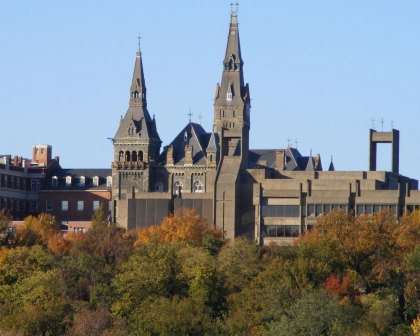
Georgetown University is confronting ties to slavery.
Image: StudyHall.Rocks.
The school will consider those applicants the same way as "members of the Georgetown community," in applying for admission, according to a report released Sept. 1 on the school's website.
The tuition for Georgetown's undergraduate programs, as reported on the school's website, roughly ranges from $46,000 to $70,000 per year. While nothing was said about offering free tuition, a statement from the school's president, John J. DeGioia, noted that there was a “framework in which to support students who are unable to meet the cost of attending Georgetown.”
In a taped address, DeGioia said the presentation of a report, made by a group that studied the sale of slaves to fund the iconic Washington-area university, was only the beginning of a sustained effort to make amends. “It by no means brings closure to our efforts,” he remarked.
During a presentation at the university, members of the audience -- including many students -- stood and applauded when DeGioia acknowledged the presence of the descendants of some of those slaves.
A report made public on Georgetown's website traces the school’s 18th century origins to “America’s slave-holding economy and culture. The most direct-such connection is through the Jesuit owned and operated plantations in Maryland.”
When Georgetown was founded in 1789, those plantations were run by slave labor. The profits of the plantation, along with the sale of slaves, funded the school. “A recruitment strategy oriented to the South deepened the school’s links to slavery and the general attitude of Jesuit faculty and students favored slavery as at least a necessary evil,” the report said.
Along with efforts to offer descendants of the Jesuit slaves preferential admission, Georgetown will:
- Rename halls that once honored the priests involved in the sale.
Remembrance Hall (once known as McSherry Hall) will be renamed Anne Marie Becraft Hall in honor of Anne Marie Becraft, a free woman of color who founded a school for black girls in the Georgetown neighborhood in 1827.
The Rev. William McSherry, president of the school from 1838 to 1839, was the other priest involved in the slave controversy, according to the school's library.
- Offer an apology.
The school will apologize for the university’s historical relationship with slavery.
- Build a memorial.
A public memorial to the enslaved will be developed to ensure their memory is honored and preserved.
- Continue the study of slavery.
The school will establish a new Institute for the Study of Slavery and Its Legacies at Georgetown.
Related:
Georgetown confronts troubled history
If you would like to comment, give us a shout, or like us on Facebook and tell us what you think.